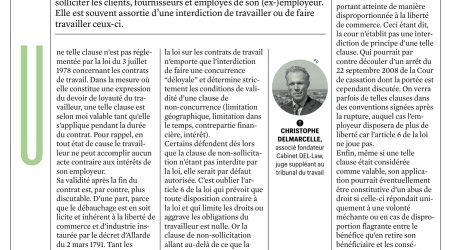Infanticide and termination of the employment contract (Echo 30-11-2022)
Posted the 2 December 2022Infanticide and breach of employment contract
While wishing the mother and the family the most sincere condolences, these terrible events raise the question of the fate of an employment contract when an employee commits a crime in the context of his private life.
First important point, article 8 5° of the law of July 3, 1978 on the employment contract provides that the employment contract is suspended when the worker is placed in preventive detention like C. And this, with suspension of salary.
Second point, the employment contract does not automatically end even if the worker is confessed, arrested and placed in preventive detention like C. Admittedly, in the event of force majeure, that is to say an unforeseeable event independent of both the will of both the employer and the worker making it impossible, temporarily or permanently, in part or totally, to perform the contract, the obligations of each are suspended. As recalled in article 28. Thus, the worker no longer has the obligation to work and the employer no longer has the obligation to pay his salary. However, the contract only ends when the impossibility of returning to work is definitive. However, preventive detention is only temporary. There will therefore only be force majeure breaking the employment contract when the worker is finally sentenced to a prison term. At this time, it will be enough for the employer to “notice” the breach of the contract as a result of an act of God.
However, third point, the employer could terminate the employee's employment contract for serious cause without notice or compensation. A serious fault is a fault whose seriousness is such that it immediately breaks all trust and makes it impossible to continue the work. And case law confirms that this fault can arise from facts of private life such as theft, the organization of fraud or trafficking, the attempted assassination of the spouse, acts of morals, etc. The employer, who must have certain knowledge of the facts, will sometimes have to wait for a final conviction of the worker before being able to act. Unless the worker is in confession, as in the case of C. Obviously, the employer will have to respect the strict formalities for a serious cause and in particular the double period of three days to dismiss and to communicate the serious reason.
Precisely, the serious cause will a priori be less advisable than fan act of God because the employee could dispute it and claim compensation for notice.
In short, the employer will be able to wait until the final decision in criminal matters – which in the case of C. seems almost certain except to invoke irresponsibility – without having to pay wages, before breaking the contract or noting its breach. without compensation.
Unless the parties agree on a termination by mutual agreement with or without compensation, the employer may sometimes wish to show humanity towards a worker benefiting from extenuating circumstances. For example, if a worker subjected to domestic violence ended up murdering or having murdered her tormentor.
Christophe Delmarcelle in L'Echo 30-11-2022
Related articles

Caution if a former colleague opposed to your employer asks you to testify in their favor

Social TV Show #1 | The Flexibility of Remuneration and Salary Transparency
